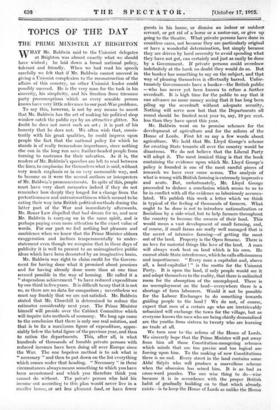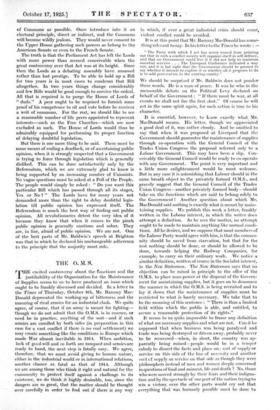TOPICS OF THE DAY
THE PRIME MINISTER AT BRIGHTON
WHAT Mr. Baldwin said to the Unionist delegates at Brighton was almost exactly what we should have wished ; he laid down a broad national policy, tolerant and friendly. When we had read his speech carefully we felt that if Mr. Baldwin cannot succeed in giving a Unionist complexion to the reconstruction of the affairs of this country, no other Unionist leader could possibly succeed. He is the very man for the task in his sincerity, his simplicity, and his freedom from tiresome party preconceptions which as every sensible person (mows have very little relevance to our post-War problems.
To say this, however, is not by any means to assert that Mr. Baldwin has the art of making his political shop window-catch the public eye by an attractive glitter. No doubt he does not covet such an art ; it is part of his honesty that he does not. We often wish that, consis- tently with his great qualities, he could impress upon people the fact that the national policy for which he stands is of really tremendous importance, since nothing else can in the long run save feather-headed people from turning to nostrums for their salvation. As it is, the readers of Mr. Baldwin's speeches arc left to read between the lines, to emphasize for themselves what is said, without very much emphasis or .in no very memorable way, and to become as it were the second authors or interpreters of Mr. Baldwin's pronouncements. In spite of this, people must have very short memories indeed if they do not remember how deeply they longed for a change from the pretentiousness and untrustworthiness which seemed to be eating their way into British political.methods during the latter part of the War and immediately . afterwards. Mr. Bonar Law dispelled that bad dream for us, and now Mr. Baldwin is carrying on in the same spirit, and is perhaps paying even more attention to the exact value of words. For our part we feel nothing but pleasure and confidence when we know that the Prime Minister abhors exaggeration and inclines temperamentally to under- statement even though we recognise that in these days of publicity it is well to present to an unimaginative public ideas which have been decorated by an imaginative brain.
Mr. Baldwin was right to claim credit for the Govern- ment for having done what it promised about pensions and for having already done more than at one time seemed possible in the way of -housing. He called it a " stupendous achievement " to have reduced expenditure by one third in five years; It is difficult to say that it is not so, as there are no data for comparison ; nevertheless we must say frankly that we are not satisfied. Mr. Baldwin stated that Mr. Churchill is determined to reduce the estimates considerably next year. The Prime Minister himself will preside over the • Cabinet Committee which will inquire into methods of economy. We long ago came to the conclusion that there is only one real solution, and that is to fix a maximum figure of expenditure, appre- ciably below the total figure of the previous year, and then to ration the departments. This, after all, is what hundreds of thousands of humble private persons with reduced incomes have been doing all over Europe since the War. The one hopeless method is to ask what is- " necessary "'and then to put down on the list everything which comes under that heading. " Necessary ". in these circumstances always means something to which you have been accustomed and which you therefore think you cannot do without. The private 'person who laid his incoine- out •according, to this plan 'would never live in a smaller •liouw., or ee:t less pleasant • food, or have fewer guests in his house, or dismiss an indoor or outdoor servant, or get rid of a horse or a motor-car, or give up going to the theatre. What private persons have done in countless cases, not because they are particularly original or have a wonderful determination, but simply because they are driven by hard necessity to avoid spending what they have not got, can certainly and just as easily be done by a Government. If private persons could overdraw, indefinitely at the bank no doubt they would do so. But the banker has something to say on the subject, and that way of pleasing themselves is effectually barred. Unfor- tunately Governments have a banker—the British public —who has never yet been known to refuse a further overdraft. It is high time for the public to say that it can advance no more money seeing that it has long been piling up the overdraft without adequate security. Nothing will serve now but that the Departments all round should be limited next year to, say, 10 per cent. less than they have spent this year.
Mr. Baldwin went on to promise schemes for the development of agriculture and for the reform of the House of Lords. First let us say a few words about agriculture. We hold that Mr. Lloyd George's scheme for creating State tenants all over the country would be disastrous. We do not believe that the Liberal Party will adopt it. The most ironical thing is that the book containing the evidence upon which Mr. Lloyd George's policy is founded is one of the most careful pieces of research we have ever come across. The, analysis of what is wrong with British farming is extremely impressive and acute. But, unfortunately, Mr. Lloyd George proceeded to deduce a conclusion which seems to us to be in conflict with all the evidence so laboriously accumu- lated. We publish this week a letter which we think is typical of the feeling of thousands of farmers.. What ought to be done is not to introduce nationalization or Socialism by a side-wind, but to help farmers throughout the country to become the owners of their land. This would mean a vast development of small farming, and, of course, if small farms are really well managed that is the secret of intensive farming—of .getting the most out of the land. Property is the Open Sesame. There is no love for material things like love of the land... A man will always work best on land which is his own. He cannot abide State interference, which he calls officiousness and impertinence. " Every man a capitalist and, above all, a land-capitalist ! " is the motto for the Unionist Party. It is upon the land, if only people would see it and adapt themselves to the reality, that there is unlimited room for the absorption of the unemployed. There is no unemployment on the land—everywhere there is a shortage of farm labourers. -Would it not be possible for the Labour Exchanges to do something towards guiding people to the land ? We do not, of course, expect that men of a certain age who are irretrievably urbanized will exchange the town for the village, but as everyone knows the men who are being chiefly demoralized are the youths from sixteen to twenty who are learning no trade at all.
We turn now to the reform of the House of Lords. We sincerely hope that the Prime Minister will put away from him all those Constitution-mongering schemes which minds that are too precise and too logical are forcing upon him. To the making of new Constitutions there is no end. Every street in the land contains sonic Abbe Sieyes who will produce a marvellous scheme when the obsession has seized him. It is as bad as cross-word puzzles. The one wise thing to do—wise because it is in accordance with the proper British habit of gradually building on to that which already.. exists—is to keep the House of Lords as unlike the House of Commons is possible. Once introduce into it an electoral jirinciple, direct or indirect, and the Commons will become wildly jealous. ' They would never consent to the Upper House gathering such powers as belong to the American Senate or even to the French Senate.
The truth is that the Parliament Act has left the Lords with more power than seemed conceivable when the great controversy over that Act was at its height. Since then the Lords as a debating assembly have amassed rather than lost prestige. To be able to hold up a Bill for two years is in most cases to condemn that Bill altogether. In two years things change considerably and few Bills would be good enough to survive the ordeal.
All that is required is to purge the House of Lords of " duds." A peer ought to be required to furnish some proof of his competence to sit and vote before he receives a writ of summons. For the rest, we should like to see a reasonable number of life peers appointed to represent interests—such as the Free Churches—which are now excluded as such. The House of Lords would thus be admirably equipped for performing its proper function of delaying doubtful legislation.
But there is one more thing to be said. There must be some means of ending a deadlock, or of ascertaining public opinion, when it is strongly suspected that a Government is trying .to force through legislation which is generally disliked. This can be done satisfactorily only by the Referendum, which we are extremely glad to know is being supported by an increasing number of Unionists. No vague-questions must be asked at a Poll of the People. The people would simply be asked : " Do you want this particular Bill which has passed through all its stages, Yes or No ? " The Lords have for many years not demanded More than the right to delay doubtful legis- lation till public opinion has expressed itself. The Referendum is much the best way of finding out public opinion. All revolutionaries detest the very idea of it because they know that when it comes to the pinch public opinion is generally cautious and sober. They are, in fine, afraid of public opinion. We are not. One of the best parts of Mr. Baldwin's speech at Brighton was that in which he declared his unchangeable adherence to the principle that the majority must rule.



















































 Previous page
Previous page